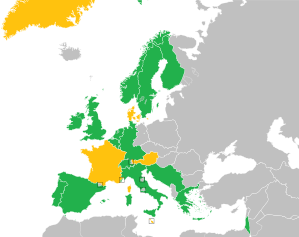1974 Eurovision Song Contest
| Eurovision Song Contest 1974 | |
|---|---|
 |
|
| Dates | |
| Final | 6 April 1974 |
| Host | |
| Venue |
The Dome Brighton, United Kingdom |
| Presenter(s) | Katie Boyle |
| Conductor | Ronnie Hazlehurst |
| Executive supervisor | Clifford Brown |
| Host broadcaster | British Broadcasting Corporation (BBC) |
| Interval act | The Wombles |
| Participants | |
| Number of entries | 17 |
| Debuting countries |
|
| Returning countries | None |
| Withdrawing countries |
|
| Vote | |
| Voting system | Each country had 10 jurors who could all give 1 vote to their favourite song. |
| Nul points | None |
| Winning song |
"Waterloo" |
The Eurovision Song Contest 1974 was the 19th edition of the annual Eurovision Song Contest.
It was held in the seaside resort of Brighton on the south coast of the United Kingdom. The BBC agreed to stage the event after Luxembourg, having won in both 1972 and 1973, declined on the grounds of expense to host the contest for a second consecutive year.
The winner of the Contest was Sweden with the song "Waterloo" which was performed by ABBA, who went on to become one of the most popular recording acts of all time. Sweden's win was their first.Katie Boyle returned to host her fourth Eurovision Song Contest (after hosting the contest in 1960, 1963 and 1968). Sandie Shaw, who won the contest in 1967 with the song "Puppet on a String", could be seen as a spectator in the audience.
Brighton is the major part of the city of Brighton and Hove (formed from the previous towns of Brighton, Hove, Portslade and several other villages) on the south coast of Great Britain. The venue which hosted the 1974 Contest was the Brighton Dome, an arts venue that contains the Concert Hall, the Corn Exchange and the Pavilion Theatre. All three venues are linked to the rest of the Royal Pavilion Estate by an underground tunnel to the Royal Pavilion in Pavilion Gardens and through shared corridors to Brighton Museum, as the entire complex was built for the Prince Regent (later George IV) and completed in 1805.
...
Wikipedia


